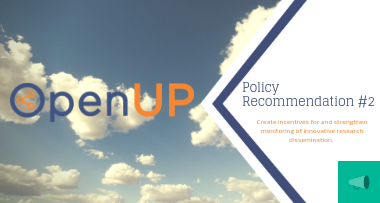OpenUP policy recommendations No 2 (Innovative Dissemination)
OpenUP synthesised and validated key project results and derived 5 recommendations to foster the take-up of novel practices in scholarly peer review, research dissemination & assessment. Discover the rational behind the Recommendation #2
Rationale
Research dissemination practices that traditionally implied a one-way communication from researchers to the public, or directed only towards other academics are changing. Social media and other web-based technologies provide an array of methods researchers can employ to disseminate their work. They also enable the public to obtain research information or to engage with researchers faster. Many research funders are also calling for stronger involvement of policymakers, industry, civil society organisations and citizens in their funded research[1]. Such engagement of different stakeholders in research and innovation is needed to foster mutual understanding, co-create research and innovation outcomes, provide input into policy agendas and ultimately to facilitate research result uptake.
Through OpenUP survey, we found that 71% of researchers agreed that it is important to disseminate research to non-research audiences, although less than a third of respondents used the dissemination channels specifically designed to reach such audiences on a regular basis. Interviews with different stakeholders also showed diverging opinions on mandates requiring researchers to engage in novel research dissemination practices [2]. Researchers, in particular, were concerned with the time and skills needed for such activities.
Still, in the innovative dissemination case studies analysed in WP4 Innovative Dissemination Framework, OpenUP demonstrated a variety of tools and strategies that research projects use to communicate their research innovatively across distinct scientific disciplines [3]. Although there are enthusiastic early adopters of innovative dissemination methods, a wider uptake is still hindered by lack of skills and time resources among researchers and research communication cultures prevailing in specific disciplines. Our interviews with key stakeholders confirm that the growing need for improved and more interactive public communication of science is accompanied by a substantial gap in the current science communication system. To improve science communication enabling better perception and awareness of science of key stakeholders and the public, we need new science communication roles and positions [4].
Recommendation #2 - Specific Actions - Relevant Stakeholders
|
Recommendation |
Specific actions |
Responsible stakeholders |
|
Create incentives for and strengthen monitoring of innovative research dissemination |
|
EU and national policy makers Research funders Institutional decision makers Libraries Altmetric providers |
More Information
OpenUP synthesised and validated key project results and derived five recommendations to foster the take-up of novel practices in scholarly peer review, research dissemination and assessment while considering existing gaps in evidence and disciplinary differences. To find out more about the OpenUP policy recommendations, follow the link.
References
[1] European Commission. (2012). Responsible Research and Innovation: Research and Innovation Europe’s Ability to Respond to Societal Challenges.
[2] Kraker, P., Bachleitner, R., et al. (2017). Deliverable D4.1 – Practices evaluation and mapping: Methods, tools and user needs. OpenUP project.
[4] Vignoli, M., Rörden, J. (2018). Deliverable D4.2. Role description: Dissemination to businesses and the public. OpenUP project




